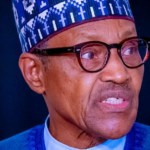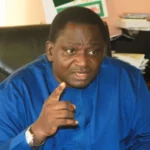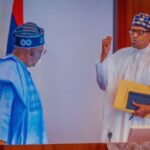There have been renewed calls from different regions, after a long silence, on the need to restructure the country. Socio-cultural groups like Ohaneze Ndigbo, Afenifere, Pan Niger Delta Forum (PANDEF), Middle Belt Forum and the new entrant, the Northern Elders Forum (NEF), have variously raised fresh agitations.
The calls further garnered momentum last Saturday when the General Overseer of the Redeemed Christian Church of God, Pastor Enoch Adeboye, called on President Muhammadu Buhari to restructure the country “as soon as possible,” warning that the people could go their separate ways if this is not done.

- Nigeria: Between wholesale and retail restructuring
- Restructuring: Yoruba leaders threaten boycott of 2023 polls
“You don’t have to be a prophet to know that one,” he added at a symposium alongside the Ooni of Ife, Oba Adeyeye Ogunwusi; former governor of Cross River State and presidential aspirant, Donald Duke, and a former minister of education, Oby Ezekwesili.
- The Reaction
His remarks and those coming from the leaders of the country’s major ethnic and regional blocs elicited strong reaction from the Presidency the following day. A presidential spokesman, Garba Shehu, said the Buhari administration would not succumb to threats and undue pressure.
Shehu, in a statement, said the Presidency was particularly reacting to the recurring threats to the corporate existence of the country, with factions giving specific timelines for the president to do one thing or another, or else, in their language, “the nation will break up.”
“This is to warn that such unpatriotic outbursts are both unhelpful and unwarranted as this government will not succumb to threats and take any decision out of pressure at a time when the nation’s full attention is needed to deal with the security challenges facing it at a time of the COVID-19 health crisis.
This administration will not take any decision against the interests of 200million Nigerians, who are the president’s first responsibility under the constitution, out of fear or threats, especially in this hour of health crisis.
“The president, as an elected leader under this constitution, will continue to work with patriotic Nigerians, through, and in line with parliamentary processes, to finding solutions to structural and other impediments to the growth and wellbeing of the nation and its people,” he said.
- “Restructuring Agenda Still on Course”
Last month, leaders of Ohaneze Ndigbo, Afenifere, Middle Belt Forum, NEF and PANDEF voiced their readiness to activate processes that would restructure the country and position it for sustainable social and economic development at a consultative dialogue on the critical challenges facing the nation to speedily implement agreed reforms and recommendations from panels of experts to be set up to articulate their goals.
The regional leaders, at the end of a crucial summit supported by religious and sub-regional and ethnic chiefs, briefed the country’s political heads of their initiative to drive restructuring of the country.
According to a communiqué signed by Ambassador Ahmed Magaji, the consultative dialogue was convened by former President Olusegun Obasanjo after extensive consultations, support and encouragement received from elder statesmen, traditional, religious, political and business leaders across the length and breadth of Nigeria.
The regional leaders resolved at the meeting to raise panels of experts to discuss, address and make recommendations on the best method to reset Nigeria’s federal structure and devolution of power, responsibilities and resources.
The experts are also to be mandated to work out solutions to the rising insecurity in the country, propose reform processes that would guarantee the integrity and credibility of elections, evolve models for effective and autonomous local government administration, lay templates for economic and fiscal federalism, and also make recommendations for judicial reforms.
According to the communiqué, the need for restructuring has become urgent in the face of growing worsening deterioration of governance, the failing economy, growing insecurity, worsening political intolerance, collapsing social and inter-communal cohesion, as well as poor performance of democratic and electoral structures.
The regional leaders observed that deterioration of governance in the country has led to declining faith in leadership and those charged with leadership at all levels, and which have combined to push our beloved country to the brinks.

They pointed at the urgency of pulling Nigeria back from the brinks and resolved to deploy their individual and collective efforts to achieve that objective.
The participating organisations, according to the communiqué, committed to support and involve themselves in all activities targeted at improving the Nigerian constitution for the purpose of meeting the yearnings and aspirations of all Nigerian citizens.
Obasanjo, who spoke at the occasion, declared the need for urgent restructuring, and warned that the country was fast drifting into political disaster as discontent and insurgency continue to arise in response to nepotism, marginalisation, ethnic cleansing and feelings of exclusion.
The former president blamed the worsening situation on bad governance and mismanagement of national diversity.

- Politics of restructuring
Before the 2019 general elections, the call for restructuring was a big political tool used by the leading opposition Peoples Democratic Party (PDP), especially its presidential candidate, former Vice President Atiku Abubakar.
The ruling All Progressives Congress (APC) challenged the PDP with the constitution of Governor Nasir el-Rufai-led Committee on True Federalism to fine-tune the party’s concept on the issue of restructuring on July 19, 2017.
The committee was inaugurated on August 10, 2017 by the former APC national chairman, Chief John Odigie-Oyegun.
The 23-man committee, which had Senator Olubunmi Adetunmbi as secretary, also had governors Abdullahi Umar Ganduje (Kano), Simon Lalong (Plateau), Oluwarotimi Akeredolu (Ondo), Yahaya Bello (Kogi); as well as former governors Rauf Aregbesola (Osun), Ibikunle Amosun (Ogun), Mohammed Abubakar (Bauchi) and Sullivan Chime (Enugu) as members.
Other members of the committee were Prof Oserheimen Osunbor; Alhaji Kashim Ibrahim; Sen Osita Izunaso; Malam Bolaji Abdullahi; Dr Ogbonnaya Onu; Sen Aisha Jummai Al-Hassan; Hajiya Aisha Ismail; Ms Sharon Ikeazor; Mrs Rachael Akpabio; Mr Ismail Ahmed, a lawyer; Hajiya Fati Bala; Jasper Azuatalem; Mrs Rinsola Abiola, and Dr Stella Dorgu.
On January 25, 2018, the chairman of the committee submitted their report to the Chief Odigie-Oyegun-led National Working Committee (NWC).
The report of the committee was officially unveiled and presented to Nigerians in Abuja on January 31, 2018.
The committee made far-reaching recommendations on the creation of states, derivation principle, fiscal federalism and revenue allocation, devolution of powers, federating units, form of government, independent candidacy, land tenure system, local government autonomy, power sharing and rotation, resource control, and type of legislature.
There were further recommendations and advice on the demand for affirmation for vulnerable groups, citizenship, ministerial appointment, state constitution, role of traditional rulers, community participation, minimum wage legislation, elections, governance, judiciary, as well as states realignment and boundary adjustment.
- Pundits Weigh-in
Pundits say the ruling APC has found itself in a very tight corner as the promise to ‘restructure’ the country is embedded in the preamble of its manifesto, which offers eight cardinal programmes to the Nigerian populace, among which is “Devolution of power.”
The preamble of the document, produced in 2013 by the Chief Audu Ogbeh-led 20-man manifesto (logo, slogan and motto) committee reads, “….To achieve this laudable programme, APC government shall restructure the country, devolve power to the units, with the best practices of federalism and eliminate unintended paralysis of the centre.”
The position of the party on ‘restructuring’ prompted the chairman of the Nigerian Governors Forum (NGF) and governor of Ekiti State, Kayode Fayemi, to insist that there was no going back on restructuring the country.
Fayemi, who stressed the need for devolution of power to the states, assured that the ruling APC had not abandoned the restructuring agenda.
- Reactions
Reacting to the renewed calls for restructuring, the Director-General of Voice of Nigeria (VON) Mr Osita Okechukwu said President Buhari had started the process by signing for the amendment of the constitution by the Eighth Assembly.
Okechukwu, who said the amendment provided that local government councils, state assemblies and judiciaries should have first-line-charge of their funds, solicited for more support from the public. He, however, agreed that there should be a need for devolution of powers.
He said, “President Buhari, to my understanding, has started restructuring with the signing of the amendment to the constitution by the Eighth Assembly. Let’s join hands to give life to it.
“There is no democracy at state and local levels. If we consolidate on that one, we move to the next line of action like devolution of powers. There are powers in the exclusive list that one can call ‘extra meat.’
“America, as at today, does not have up to 100 amendments after 200 years. Amendment is on a gradual basis.
“What Buhari needs is support because I understand that governors of the 36 states of the federation have gone to court to oppose Executive Order 10.”
However, Tunde Salman, the convener of Good Governance Team, Nigeria, stressed the need for a new constitution, saying the recurring debate on restructuring of Nigeria cannot be dismissed
Salman said, “The recurring debate on restructuring of Nigeria cannot be dismissed or seen as misguided. As the country faces multiple challenges, looking at what should be done differently to make it more viable and effective is important. Therefore, there’s an urgent need to write a new constitution for Nigeria that will support genuine devolution of powers to sub-national authorities with commensurate fiscal resources to enable them carry out their responsibilities.”
Also speaking on the development, eminent Nigerian elder statesmen said while they backed the call for restructuring of the country to bring development, they would not support any call for breakup.

They said this during a virtual meeting on the state of the nation, organised by the National Political Summit Group (NPSG) and the National Consultative Front (NCF).
The meeting was attended by 94 elders and technocrats, including Alhaji Ahmed Joda; Uma Eleazu; Pa Ayo Adebanjo; Ghali Na’Abba; Ubaluzuike Amaechi; Tanko Yakassai; Hakeem Baba Ahmed; Kalu Idika Kalu; Uche Azikiwe, the late Nnamdi Azikiwe’s widow; Mallam Adamu Ciroma’s wife, Inna; Josephine Anenih, and Obafemi Awolowo’s daughter, Tokunbo.
Others are Elder Nat Okoro; Mrs Florence Ita Giwa; Zainab Maina; Kema Chikwe; Obong Atah; Obadiah Mailafia; Prof Pat Utomi; Zainab Kuchi; Falalu Bello; Timi Agary; Mike Ajeigbo; Gabriel Aduku; Kunle Olajide, among others.
They noted that the national dialogue was held amidst the tension of separatist calls, especially protest rallies in that regard on Independence Day.
They also noted the activities of terrorists, insurgents and armed bandits in the country.
They said that Nigeria as a multi-cultural, multi-ethnic and multi-religious entity should naturally be an asset to all citizens, but due to foisted and warped constitutional system and structure, the country has suddenly become a liability.
The communique of the meeting was signed by Mallam Nastura Ashir Shariff and Arc Ezekiel Nya Etok.
The elders, however, resolved to set up a 40-member national reconciliation, healing and political reform commission to fashion a new system and structure for Nigeria to douse tension and separatist calls in the country.
But a former chairman of the Transition Monitoring Group (TMG), Comrade Mashood Erubami, said calls for restructuring on fault lines were not good for the country, and should, therefore, stop.
He also said move by some political groups to select another set of eminent personalities to restart dialogue on the problems of Nigeria amounted to chasing shadows, inappropriate and self-serving.
He said the best way forward would be the implementation of the recommendations of past national political conferences.
Erubami, who is currently the president and convener, Nigeria Voters Assembly (VOTAS), said the new attempt by the NPSG and NCF to convey an emergency national dialogue on the constitutional future of Nigeria would not be different from the National Assembly’s recurring attempt to embark on another endless constitutional amendment.
“The eminence and sterling qualities of those to be included in the list alone cannot guarantee the viability and workability of Nigeria, unless and until the birth defects of this country since 1914 are corrected. That is a misleading appellation of Nigeria as a federation. Regionalism must be reinstated, and states already created should be made to work under those regions,” Erubami said.
The renowned pro-democracy and human rights activist said Nigerians were tired and could not afford to continue amending a faulty constitution, leaving the defects unaltered. He said the 1999 Constitution had been found to contain serial defects, which can only be removed through fundamental changes in its structure.
“The National Assembly, instead of embarking on another constitution amendment jamboree, should be courageous to ask the president for the proceedings and recommendations of the past two political conferences, review and align their contents for final implementation.
“The conferences organised by former presidents, Chief Olusegun Obasanjo and Dr Goodluck Jonathan provide the best examples of documents that can heal the known wounds on each ethnic nationality. The conferences were quite representative and addressed the issues then. What remains is the political will to implement the recommendations,” Erubami said.

 Join Daily Trust WhatsApp Community For Quick Access To News and Happenings Around You.
Join Daily Trust WhatsApp Community For Quick Access To News and Happenings Around You.


